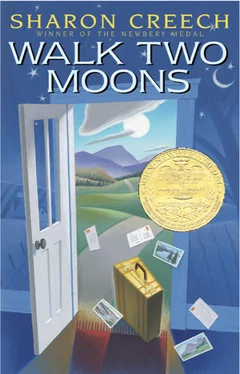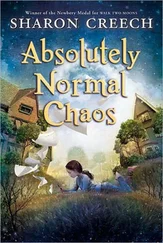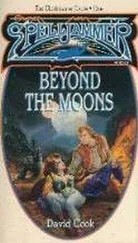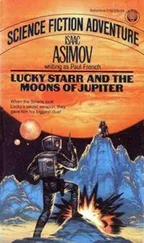“I thought they would be grandiful surprises for you—like fortune cookies, only I didn’t have any cookies to put them in. Did you like them anyway?”
Phoebe looked at me for a long minute. Then she went down the steps and said, “Mrs. Partridge, when was it you met my brother?”
“You said you didn’t have a brother,” Mrs. Partridge said.
“I know, but you said you met him. When was that?”
She tapped her head. “Noggin, remember. Let’s see. Some time ago. A week? Two weeks? He came to my house by mistake. He let me feel his face. That’s why I thought he was your brother. He has a similar face. Isn’t that peculible?”
Phoebe said, “No more peculible than most things lately.” As Mrs. Partridge tottered back to her house, Phoebe said, “It’s a peculible world, Sal.” She walked across the grass and spit into the street. She said, “Come on, try it.” I spit into the street. “What do you think?” Phoebe said. We spit again.
It might sound disgusting, but to tell the truth, we got a great deal of pleasure from those spits. I doubt if I ever could explain why that was, but for some reason it seemed the perfect thing to do, and when Phoebe turned around and went into the house, I knew that was the right thing for her to do too.
With the courage of that spit in me, I went to see Margaret Cadaver, and we had a long talk, and that’s when I found out how she met my father. It was painful to talk with her, and I even cried in front of her, but afterward I understood why my father liked to be with her.
Ben was sitting on my front steps when I got home. He said, “I brought you something. It’s out back.” He led me around the side of the house and there, strutting across that little patch of grass, was a chicken. I was never in my life so happy to see a chicken.
Ben said, “I named it, but you can change the name if you want.”
When I asked him what its name was, he leaned forward, and I leaned forward and another kiss happened, a spectacular kiss, a perfect kiss, and Ben said, “Its name is Blackberry.”
“Oh,” Gram said, “is that the end of the Peeby story?”
“Yes,” I said. That wasn’t quite true, I suppose, as I could have told more. I could have told about Phoebe getting adjusted to having a brother, and to her “new” mother, and all of that, but that part was still going on, even as we traveled through the mountains. It was a whole different story.
“I liked that story about Peeby, and I’m glad it wasn’t too awfully sad.”
Gram closed her eyes and for the next hour as Gramps drove toward Coeur d’Alene, he and I listened to her rattly breathing. I watched her lying there so still, so calm. “Gramps,” I whispered. “She looks a little gray, doesn’t she?”
“Yes she does, chickabiddy, yes she does.” He stepped on the gas and we raced toward Coeur d’Alene.
At Coeur d’Alene, we went straight to the hospital. Gramps had tried to wake Gram when he saw the lake. “Gooseberry?” Gramps said. She slumped sideways on the seat. “Gooseberry?”
The doctors said Gram had had a stroke. Gramps insisted on being with her while she underwent tests, though an intern had tried to dissuade him. “She’s unconscious,” the intern said. “She won’t know whether you’re here or not.”
“Sonny, I’ve been by her side for fifty-one years, except for three days when she left me for the egg man. I’m holding on to her hand, see? If you want me to let go, you’ll have to chop my hand off.”
They let him stay with her. While I was waiting in the lobby, a man came in with an old beagle. The receptionist told him he would have to leave the dog outside. “By herself?” the man said.
I said, “I’ll watch her. I had a dog just like her once.” I took the old beagle outside, and when I sat down on the grass, the beagle put her head in my lap and murmured in that special way dogs have. Gramps calls it a dog’s purr.
I wondered if Gram’s snake bite had anything to do with her stroke, and if Gramps felt guilty for whizzing off the highway and stopping at that river. If we hadn’t gone to that river, Gram would never have been bitten by that snake. And then I started thinking about my mother’s stillborn baby and maybe if I hadn’t climbed that tree and if my mother hadn’t carried me, maybe the baby would have lived and my mother never would have gone away, and everything would still be as it used to be.
But as I sat there thinking these things, it occurred to me that a person couldn’t stay all locked up in the house like Phoebe and her mother had tried to do at first. A person had to go out and do things and see things, and I wondered, for the first time, if this had something to do with Gram and Gramps taking me on this trip.
The beagle in my lap was just like our Moody Blue. I rubbed her head and prayed for Gram. I thought about Moody Blue’s litter of puppies. For the first week, Moody Blue wouldn’t let anyone come anywhere near those puppies. She licked them clean and nuzzled them. They squealed and pawed their way up to her with their eyes still sealed.
Gradually, Moody Blue let us touch the puppies, but she kept her sharp eyes on us, and if we tried to take a puppy out of her sight, she growled. Within a few weeks, the puppies were stumbling away from her, and Moody Blue spent her days herding them back, but when they were about six weeks old, Moody Blue started ignoring them. She snapped at them and pushed them away. I told my mother that Moody Blue was being terrible. “She hates her puppies.”
“It’s not terrible,” my mother said. “It’s normal. She’s weaning them from her.”
“Does she have to do that? Why can’t they stay with her?”
“It isn’t good for her or for them. They have to become independent. What if something happened to Moody Blue? They wouldn’t know how to survive without her.”
While I prayed for Gram outside the hospital, I wondered if my mother’s trip to Idaho was like Moody Blue’s behavior. Maybe part of it was for my mother and part of it was for me.
When the beagle’s owner returned, I went back inside. It was after midnight when a nurse told me I could see Gram. She was lying, still and gray, on the bed. A little dribble was coming out of one side of her mouth. Gramps was leaning over her, whispering in her ear. A nurse said, “I don’t think she can hear you.”
“Of course she can hear me,” Gramps said. “She’ll always be able to hear me.”
Gram’s eyes were closed. Wires were attached to her chest and to a monitor, and a tube was taped to her hand. I wanted to hold her and wake her up. Gramps said, “We’re gonna be here a while, chickabiddy.” He reached in his pocket and pulled out his car keys. “Here, in case you need anything from the car.” He handed me a crumpled wad of money. “In case you need it.”
“I don’t want to leave Gram,” I said.
“Heck,” he said. “She doesn’t want you sitting around this old hospital. You just whisper in her ear if you want to tell her anything, and then you go do what you have to do. We’re not going anywhere, your grandmother and I. We’ll be right here.” He winked at me. “You be careful, chickabiddy.”
I leaned over and whispered in Gram’s ear and then I left. In the car, I studied the map, leaned back in the seat, and closed my eyes. Gramps knew what I was going to do.
The key was cold in my hand. I studied the map again. One curvy road ran direct from Coeur d’Alene to Lewiston. I started the car, backed it up, drove around the parking lot, stopped, and turned off the engine. I counted the money in my pocket and looked at the map once more.
In the course of a lifetime, there were some things that mattered.
Читать дальше












